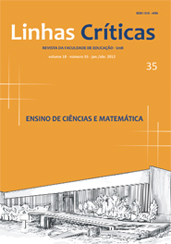Viajes por el campo virtual: aprendiendo más allá de losmuros del aula
DOI:
https://doi.org/10.26512/lc.v18i35.3838Palabras clave:
Viaje de campo virtual, Lectura, EscrituraResumen
Este artículo ofrece una visión general acerca de un abordaje holístico destinado ainvolucrar alunos en procesos de lectura y escritura, mientras estaban implicados enun tema científico. Recientes avances en el campo tecnológico y de acceso a Internetabrieron una infinidad de recursos nunca antes disponibles para professores yalumnos. Muchos de estos avances, incluyendo viajes de campo virtual, pueden serusados para estimular el interés y motivar a los alumnos para selecionar sus propiostópicos de interés y orientar investigaciones, lecturas y aprendizajes (Scott, 2007). Esteartículo presenta un relato sobre la explotación y uso de viajes de campo virtualescomo forma de involucrar a los alunos en actividades de investigación, escritura eintercambio de sus conocimientos en el desarrollo del ciclo de vida de águilas. El localdonde nidifican las águilas es en Decorah, Iowa, ofreciendo el local para el viaje decampo virtual que está siendo relatado.
Descargas
Citas
AKERSON, Valarie; YOUNG, Terrell. Science the “write” way. Science & Children. Arlington VA, v. 43,n. 3, p. 38-41, nov./dez. 2005.
BOGDAN, Robert; BIKLEN, Sari. Qualitative research for education: An introduction to theories andmethods (4aEd.). Toronto: Allyn and Bacon, 2003.
CRESWELL, John. Qualitative inquiry and research design: Choosing among five traditions. ThousandOaks: Sage Publications, 1998.
EMPSON, Rip. Nearing 100 million views, decorah eagles become the most watched live stream ever.(n.d.). Disponível em <http://techcrunch.com/2011/05/12/nearing-100-million-views-decorah-eagles-become-the-most-watched-live-stream-ever/>. Acesso em: 15 setembro de 2011.
FELDMAN, Dara. Technology and early literacy: A recipe for success. 2002. Disponível em. Acesso em: 15 setembrode 2011.
FULTON, Kathleen. Learning in a digital age: Insights into the issues. Technological Horizons InEducation. Irvine, n. 25, p.14-41, 1998.
GUTHRIE, Larry F.; RICHARDSON, Susan. Language arts: Computer literacy in the primary grades.Educational Leadership. Alexandria, v. 53, n. 2, p. 14-17, 1995.
GARDNER, Howard. Multiple intelligences: New horizons. New York: Basic Books, 2006.
HODSON, Derek. Science curriculum development: Lessons from the past. In: DEREK. Hodson;BENCZE, John Lawrence; PEDRETTI, Erminia; NYHOF-YOUNG, Joyce (Eds.) Changing scienceeducation through action research: Some experiences from the field. Toronto: Imperial Oil Centre forStudies in Science, Mathematics and Technology Education; Ontario Institute for Studies in Education,University of Toronto, 2001, p. 25-43.
KILBOURN, Brent. For the love of teaching. London: The Althouse Press, 2000.
KLEMM, Barbara; TUTHILL, Gail. Virtual field trips: Best practices. International Journal of InstructionalMedia. Tolland, v. 30, n. 2, p. 177-193, 2002.
LINCOLN, Yvonna; GUBA, Egon. Paradigmatic Controversies, Contradictions, and Emerging Confluences.In: DENZIN, Norman; LINCOLN, Yvonna (Eds.). Handbook of Qualitative Research. Thousand Oaks:Sage, 2000, p.163-188.
MERTLER, Craig. Action research: Teachers as researchers in the classroom. Thousand Oaks: SagePublications, 2006.
ONTARIO MINISTRY OF EDUCATION AND TRAINING. The Ontario curriculum, Grades 1-8: socialstudies. Toronto, On: Queen’s Printer for Ontario, 1998.
PARR, Michann; CAMPBELL, Terry. Teaching the language arts. Mississauga, On: John Wiley & Sons,Ltd, 2012.
PEDRETTI, Erminia. Facilitating action research in science, technology and society (STS) education:an experience in reflective practice. Educational Action Research. Routledge, v. 9, n. 3, p. 307-327,1996.
PEDRETTI, Erminia. Action research in science-technology-society education: The road less traveled(Unpublished doctoral thesis). Ontario Institute for Studies in Education, University of Toronto, Toronto,Canada, 1994.
RISINGER, C. Frederick. Using online field trips and tours in social studies. Social Education, 74(3),2010. 137-138.
SCOTT, Jeff. Exploring the use of virtual field trips with elementary school teachers:A collaborativeaction research approach (Unpublished doctoral thesis). Ontario Institute for Studies in Education,University of Toronto, Toronto, Canada, 2007.
STAKE, Robert. E. Case Studies. In: DENZIN, Norman; LINCOLN, Yvonna. (Eds.), Handbook ofqualitative research(2ndEd). London: Sage Publishing, 2005, p. 236-247.
STANDEN, Andrew. Grounded. Edutopia, October, 2005, p. 34-39.
STRICKLAND, Dorothy S.; GANSKE, Kathy; MONROE, Joanne K. Supporting struggling readers andwriters: Strategies for classroom intervention. Portland: Stenhouse Publishing, 2006.
UNDERWOOD, Jean. A comparison of two types or computer support for reading development. Journalof Research in Reading. Coventry, v. 23, n. 2, p.136-148, 2000.
VETO, Dori. Motivating reluctant adolescent readers. The School Administrator. Alexandria, v. 63, n.4, p. 31-34, 2006.
ZANETIS, Jan. The beginner’s guide to interactive virtual field trips. Learning & Leading with Technology.Eugene, v. 37, n. 6, p. 20-24, 2010.
Descargas
Publicado
Cómo citar
Número
Sección
Licencia
Derechos de autor 2016 Linhas Críticas

Esta obra está bajo una licencia internacional Creative Commons Atribución 4.0.
Autores que publicam nesta revista concordam com os seguintes termos:
- Autores mantém os direitos autorais e concedem à revista o direito de primeira publicação, sendo o trabalho simultaneamente licenciado sob a Creative Commons Attribution License, o que permite o compartilhamento do trabalho com reconhecimento da autoria do trabalho e publicação inicial nesta revista.
- Autores têm autorização para assumir contratos adicionais separadamente, para distribuição não-exclusiva da versão do trabalho publicada nesta revista (ex.: publicar em repositório institucional ou como capítulo de livro), com reconhecimento de autoria e publicação inicial nesta revista.
- Autores têm permissão e são estimulados a publicar e distribuir seu trabalho online (ex.: em repositórios institucionais ou na sua página pessoal) a qualquer ponto antes ou durante o processo editorial, já que isso pode gerar alterações produtivas, bem como aumentar o impacto e a citação do trabalho publicado.



